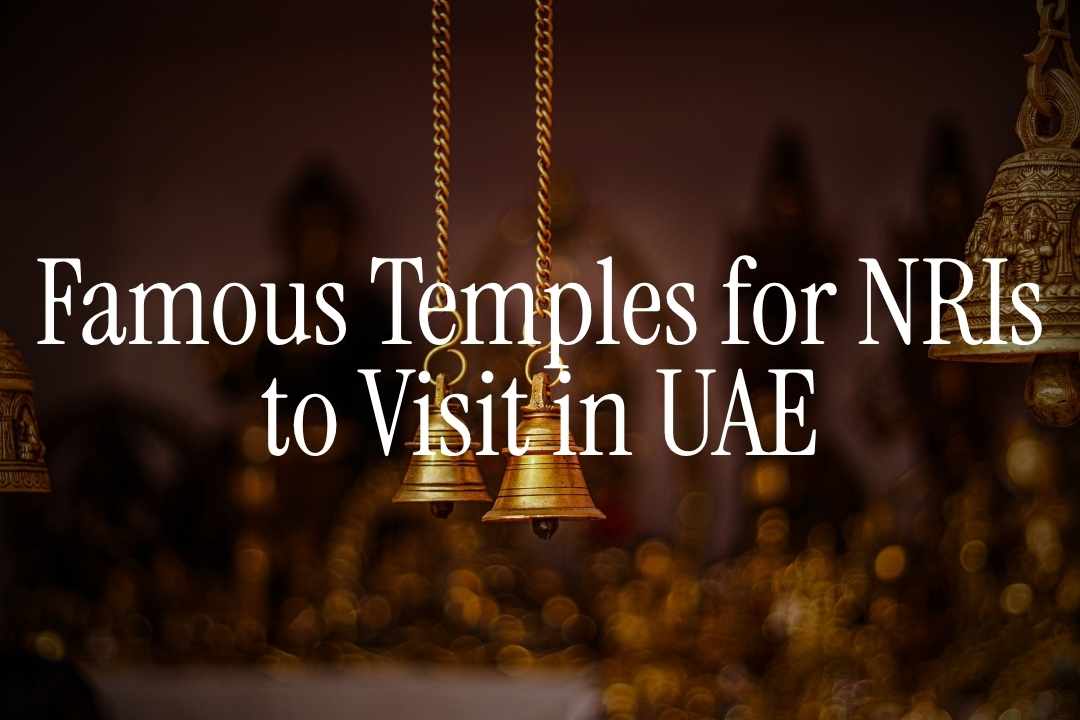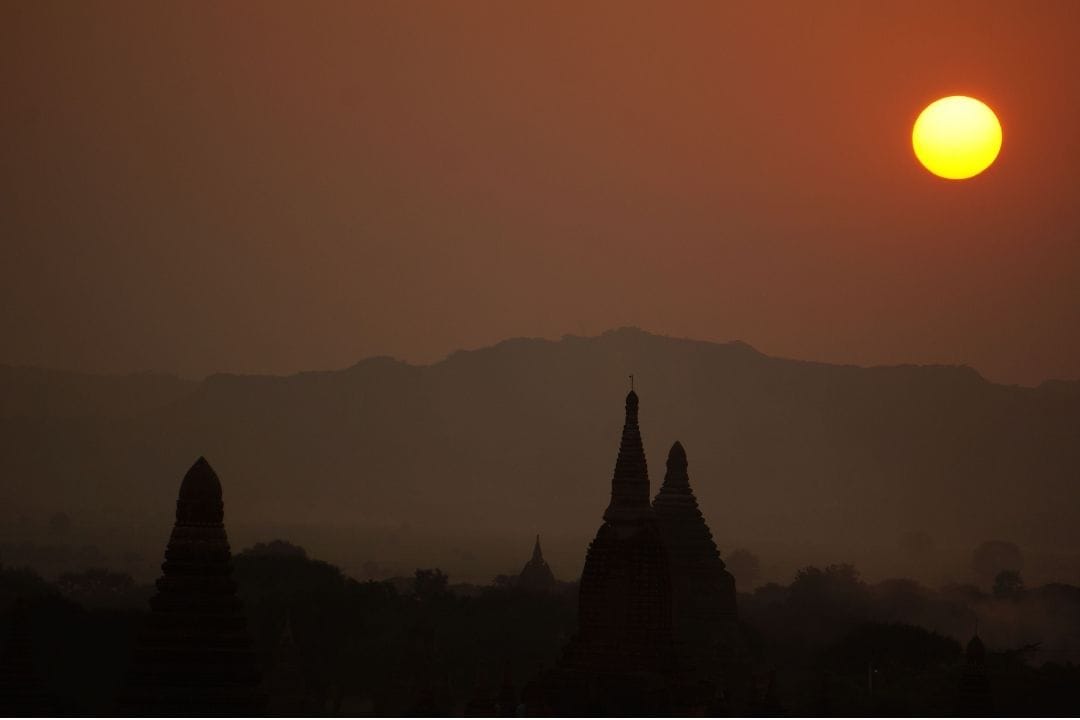Famous Temples for NRIs to Visit in UAE

Cultural traditions in the form of various festivals and religious practices are a deeply rooted and integral part of Indian life. If you are Indian, visiting a place of worship is an important and cherished activity, often as a regular weekly event with your family.
Many significant religious sites in the UAE offer Indians a sense of belonging and cultural continuity. Among other diverse cultural elements on offer, you and your family can visit these well-known places of worship in the UAE.
These also serve as venues where Indian communities unite to celebrate festivals such as Diwali and Guru Purnima with great fervour. You and your family can visit these places of worship to experience the warmth of the Indian communities in the UAE and stay connected to your cultural roots.
Famous Temples for NRIs to Visit in UAE
UAE is a country with a fusion of cultures where different communities co-exist peacefully and diversity is celebrated. The UAE has several famous religious sites and temples you can visit. The following are the famous temples in the UAE:
1. Shree Krishna Haveli, Bur Dubai
Shree Krishna Haveli, also known as Shrinathji’s Temple, is one of the oldest Hindu temples established in Bur Dubai in the mid-1940s when Hindus longed for a common place of worship. It started out as a mud structure that was later converted into a full temple in 1958 when HH Sheikh Rashid Bin Saeed Al Maktoum granted the land next to a mosque. The temple got its proper haveli look later when it was refurbished again in 1997. The temple is managed by the Mercantile Hindu Community of Thatta (Sind)/MHCT (S).
Visiting hours:
- Monday to Saturday from 7:00 am to 7:45 pm
- Sunday from 6:30 am to 7:45 pm
Aarti timings:
- Morning mangala aarti: 7:00 am
- Evening aarti: 7:30 pm
Darshan timings:
- Mangla: 6:30 am to 7:15 am
- Shringar: 8:30 am to 9:30 am
- Rajbhog: 10:15 am to 11:45 am
- Utthapan: 5:00 pm to 5:30 pm
- Sandhya: 6:15 pm to 8:00 pm
2. BAPS Hindu Mandir, Abu Dhabi
The BAPS Hindu Mandir, the first traditional Hindu stone temple in the UAE, was built by the BAPS Swaminarayan Sanstha in Abu Dhabi. In 2015, the Crown Prince of Abu Dhabi, Sheikh Mohammed bin Zayed Al Nahyan, allotted 27 acres of land for the mandir. This newly established temple was inaugurated in March 2024 by the Prime Minister of India, Shri Narendra Modi.
This Mandir is an architectural marvel and spiritual haven that showcases traditional Indian design and intricate carvings reflecting rich Indian culture. The mandir is located near Al Rahba, off the Dubai-Abu Dhabi Sheikh Zayed Highway (E11), which makes it a serene environment for worship and religious activities.
An online registration facility is available for visit. It is important to note the dress code, as only traditional attire is allowed. Translucent and tight clothing are not allowed.
Visiting hours:
- Tuesday to Sunday: 9:00 am to 8:00 pm
- Monday: Closed
Aarti timings:
- Mangla aarti: 5:30 am
- Shangar aarti: 7:15 am
- Thaar aarti: 9:30 am and 6:15 pm
- Rajbhog aarti: 10:10 am
- Sandhya aarti: 7:15 pm
- Shayan aarti: 8:45 pm
3. Shirdi Sai Baba Mandir, Dubai
There are 2 well known shrines dedicated to Shirdi Sai Baba in Dubai. The first one is within the newly established Hindu Temple in Jebel Ali Village, Dubai. It features 15 sanctums, each dedicated to the deities such as Ganesh, Shiva, Vishnu, Durga, Lakshmi, Murugan, Shirdi Sai Baba, and Hanuman, offering a truly divine experience. The erstwhile Shiva Temple has been relocated to this temple complex as well. Here is the link to the location.
Explore the best markets in Dubai for shopping, unique finds, and cultural experiences.
The second is the Sai Baba Temple in Jumeirah, Dubai, a popular spiritual destination for Sai Baba devotees. It offers a serene atmosphere for prayer and meditation. Devotees can offer prayers, participate in Sai Bhajans and Shlokas, and perform Abhishekam. Since this is a private property, non-members visiting the temple are required to pay an entry fee of 30 AED.
4. The ISKCON Temple, Dubai
The ISKCON Temple is located in Karama, Dubai. This is a significant spiritual center for devotees of Lord Krishna in the UAE where global events and conferences are held regularly for the congregation. The calendar of events is published ahead of time so that devotees can plan their visits accordingly.
Discover the top restaurants in Dubai for a world-class dining experience.
You can visit this temple and enjoy a sattvic meal while participating in many religious activities being arranged by the temple. The temple is open for visitors daily from 5:00 am to 7:30 pm.
5. Gurunanak Darbar Sikh Gurudwara, Jebel Ali Village
The public push for a Gurdwara in Dubai officially started 27 years ago, and the foundation for the construction of the Gurunanak Darbar was laid in 2010, which included all the Sikh ceremonies. It is a multi-storey building with a blend of modern and traditional architecture located in Jebel Ali village at the T-junction of two large accessible roads.
Find the best Indian supermarkets in the UAE for authentic groceries and spices.
The community kitchen, Langar, serves free meals throughout the day to all visitors. You can participate in Kirtan programs, and special events take place here. The Gurudwara is open for visitors daily from 4:30 am to 9:30 pm. Morning prayer begins at 4:30 am, and evening prayers at 6:30 pm.
6. Dubai Jain Derasar, Bur Dubai
This Shwetambar Jain Temple in Dubai is a unique spiritual hub for the people of the Jain community. The temple is dedicated to three main Tirthankaras – Lord Vimalanatha, Lord Sumatinath and Lord Parshwanath. Located in Al Mussallah Tower, Bur Dubai, Jain Derasar depicts the rich culture of Jainism. This Jain temple is open for visitors on all days from 6:45 am to 9:30 pm.

How Hindu Temples Help NRIs Feel at Home in the UAE
While these are the main temples, UAE is also home to many other smaller places of worship that cater to the diverse religious communities living in the city. NRIs living in UAE and their families can visit these sacred sites and connect with their cultural roots.
These temples are not only places of worship but also cultural hubs where various festivals and community activities take place. Exploring these temples allows parents to stay in touch with their cultural roots and find a sense of belonging in the vibrant Indian diaspora in the UAE, and children to be immersed in Indian cultural and religious values, making their stay enriching and fulfilling.

Comments
Your comment has been submitted